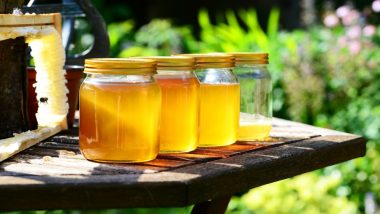Diabetes is tricky and to say the least, challenging when it comes to food options. Put simply, artificial sweeteners are a strict no! However, if you have to choose between the lesser evil, the natural sweeteners are always a better pick. Wherever you look in the grocery store or restaurants, sugar and natural sugar substitutes are added to just about everything. The sweet drug of choice comes by many names, even super-healthy-sounding euphemisms, so it can be hard even recognising sugar in all its varying forms If you do not know what to choose when you are at the grocery store, from honey to stevia, here are a few options.
1. Honey
Honey is one of the best options when you need to add a little sweetness to your food. Honey has enormous benefits as long as you purchase it raw, unpasteurised and unfiltered. It contains a range of powerful antioxidants like polyphenols which help promote heart health and beat cancer. Plus, the bee pollen in honey has been shown to boost the immune system.
2. Maple syrup
A 100 percent pure, organic maple syrup can be a much better option than traditional sugar as it contains zinc and infection-fighting polyphenol antioxidants. Maple syrup is sourced from tree sap and so, it goes through minimal processing to reach it conventional form. Always be sure to pick the darker maple syrup as it contains higher amounts of antioxidants. Here are 8 simple ways to reduce your risk of diabetes.
3. Molasses
This sweetener is made by boiling sugar down to remove the sucrose. The thick syrup that is left behind is molasses. The blackstrap molasses is the most nutrient-dense form of molasses which is achieved by processing the syrup three times to remove as much sucrose as possible. Did you know blackstrap molasses contains more iron than any other natural sweetener?
4. Dates
These sweet delights are completely unprocessed and can be eaten dried, fresh or pureed into recipes. However, keep their intake to a minimum as they are very high in fructose. Here are some tips that can help patients with diabetes and heat intolerance.
5. Coconut Sugar and Nectar
These sweeteners are derived from the coconut blossoms of the coconut tree, and not the coconut itself. Overall this is still a better option than regular sugar as it does contain nutrients like zinc, potassium, and short-chain fatty acids. Coconut sugar contains inulin fibre, which has been shown to help improve diabetic health, as it helps slow the absorption of glucose and keep blood-sugar levels balanced. But you would have to eat a lot to make a difference so you would better stick to natural options.
6. Stevia
A zero-calorie low-glycemic sweetener that’s natural sounds too good to be true. But it all depends on what kind of stevia you are buying. Make sure that you pick raw, organic stevia that is still in its green form. Avoid conventional stevia brands that are often heavily processed and bleached.
With any of these options, moderation is still key and you should only stick to a few tablespoons in a day.
(This article is written for an informative purpose and should not be substituted for medical advice. Kindly consult your doctor before trying any tips.)
(The above story first appeared on LatestLY on Jul 08, 2019 02:43 PM IST. For more news and updates on politics, world, sports, entertainment and lifestyle, log on to our website latestly.com).













 Quickly
Quickly


